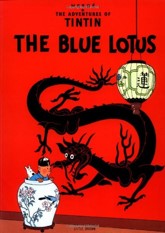The Blue Lotus (Tintin #5)
Picking up where he left off in the Egyptian adventure Cigars of the Pharaoh, Tintin travels to China in The Blue Lotus, a tale which is generally considered Herge's first masterpiece. It's also Tintin's only foray into actual history, specifically the Sino-Japanese conflicts of the early 1930s. The political tensions combined with the chilling threats of drugs give the story an especially high and realistic sense of danger. Herge's interest in China was spurred by a friendship with a young Chinese student named Chang Chong-chen, a relationship that Tintin mirrors with a Chinese boy also named Chang Chong-chen. Herge paints a vivid picture of China and takes the opportunity to denounce ethnic prejudices (though ironically his artistic depiction of the Japanese businessman Mitsuhirato is quite grotesque). Years later, Tintin's relationship with Chang would become the basis of Tintin in Tibet.

